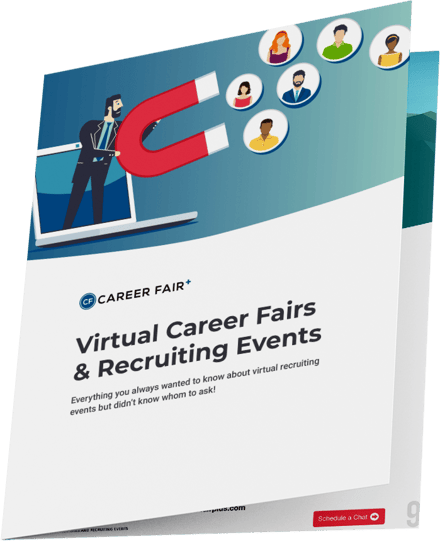
You’re taking the next career step by attending a hiring event-congrats! This is a fantastic opportunity to connect with recruiters, mingle with potential co-workers, and explore possible roles in multiple industries.
Still, showing up is easier said than done sometimes, right? Spending a morning or afternoon meeting strangers can be overwhelming, especially when you're unsure of what to expect.
That's why Career Fair Plus (CF+) is sharing simple, actionable tips to make recruiting events work for your job search. So, get ready to impress, stand out, and increase the chance of landing your dream job.
Do your homework
You’ve likely heard this before, but that’s because it’s solid advice: check out the companies where you’d accept a job offer. Explore the types of people they’re looking for, their values, goals, and culture. See what you can discover by reading:
- Official websites, especially to discover what’s important to you, like mission statements, community involvement, or sustainability initiatives
- Company reviews (but don’t judge too harshly or quickly; look for trending topics or issues reported year after year)
- Social media, though obvious, is worth following for a fuller picture of company news or to learn how they engage with customers
There’s a BOGO here, too: your research might inspire thoughtful–and impressive–questions to ask at the hiring event, like:
- What would you like me to know about your company’s mission and vision?
- Will you describe three things that distinguish your organization’s approach to industry challenges?
- What are the core elements of the employee handbook, and how have they changed over the last five years?
- How do you support your employees as people?
- How do you define and support work-life balance?
- What professional development opportunities do you provide?
Remember, insight into the business and how a potential supervisor engages with you are important decision factors in accepting a job offer.
Asked and answered
While you’re preparing a list of questions for the interviewer, practice answering what they’re likely to ask you! Be ready with brief, informative, and direct responses about your work philosophy, experience, and qualifications. You might even Google common interview questions for your target employers. Today’s technology creates plenty of opportunities to benefit from others’ experiences!
Details matter–review your resume one more time
Resumes, and when applicable, portfolios are still important for at least three reasons:
- They help you stand out because you’re the only person with your resume and portfolio.
- Your resume and portfolio instantly indicate what you bring to the organization.
- You have noteworthy answers to any questions interviewers ask based on either document.
- You guide conversations by choosing which skills and accomplishments you highlight.
Keep both documents updated with all your professional experience, certifications, and education. Fill your portfolio with impactful and imaginative projects relevant to the open roles you're targeting.
The cliché is true: dress for success
First impressions are lasting impressions whether you're attending your first (or fifth) recruiting event. A professional appearance conveys respect for the people you’re meeting. Also, a coordinated outfit suggests you planned your appearance versus throwing something on at the last minute. Managers want team members who think ahead. Clothes show your personality, and individual style, so wear something unique and welcoming. Finally, consider avoiding the ever-present black or navy blue color pallet, so you stand out from the competition.
This cliché is true, too: practice makes perfect
Or at least confident. Use a mirror (or a good friend) to practice introducing yourself to recruiters, highlighting your relevant skills and experience. Be brief and on point; smile and make eye contact. A calm and smooth introduction sets the right tone for the rest of your conversation–and, hopefully an interview!
Carry your enthusiasm and confidence beyond the introductions, too. Imagine yourself in front of the group you’re hoping to join. Engage recruiters the same way you want your co-workers to interact with you. Be friendly, approachable, and actively listen to everyone.
Make new friends (a.k.a., connections)
A hiring event is your chance to chat with other professionals and job seekers.
- Get the inside scoop: talking with other people in similar roles and candidates with an interview history at your target employers often reveals meaningful insights about a potential employer.
- Boost your chances of landing a job: The more people you know, the more people who know you to recommend you when their hiring manager asks for a “good fit” to fill an open role.
You never know who you might meet or how valuable they could be along your job search and work journey.
Mind your manners–say “thank you”
Don’t disappear when the clock strikes midnight– or maybe 5:00 pm. A polite follow-up (i.e., not pushy) keeps your name top of mind and proves your interest in the position.
- Send emails or hand-written notes thanking people for their time.
- Connect on LinkedIn to keep in touch and share professional updates like an original lesson plan or an award.
- Reach out later if you don’t hear back quickly with a friendly email reinforcing your enthusiasm and interest.
Participating in one recruiting program is just a single step in your job search. You might need to attend multiple events or apply to several different companies to secure your preferred offer.
Most importantly, be yourself and let your passion for your career goals shine through!
